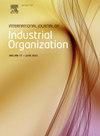谁与何时:设计组织中的决策过程
IF 1.7
3区 经济学
Q2 ECONOMICS
International Journal of Industrial Organization
Pub Date : 2024-09-23
DOI:10.1016/j.ijindorg.2024.103111
引用次数: 0
摘要
本文分析了在一个模型中并行决策与顺序决策的对比,在这个模型中,两个单位首先进行沟通,然后做出决策,试图既适应当地条件,又与合作伙伴协调。与同时决策相比,顺序决策改善了整体信息共享。然而,先行者也有动机过度适应自己的状态,因为他们知道后行者会服从他们的决策。盈余最大化的总部更倾向于顺序决策,而不是同时决策,当且仅当 (i) 两个单位的局部条件具有足够不同的波动性,以及 (ii) 它们的协调需求足够不对称或足够低。最后,即使考虑到涉及在单位和总部之间重新分配决策权的额外治理结构,顺序决策也是最优的,并表明顺序决策会使一些通常分析的分权形式变得次优。本文章由计算机程序翻译,如有差异,请以英文原文为准。
Who versus when: Designing decision processes in organizations
This paper analyzes concurrent versus sequential decision-making in a model where two units first communicate and then make decisions, attempting to both adapt to their local conditions and coordinate with their partner. Sequential decision-making improves overall information sharing compared to concurrent decision-making. However, first movers also have an incentive to over-adapt to their state, knowing second movers will conform to their decision. A surplus-maximizing headquarters prefers sequential decision-making to concurrent if and only if (i) the two units' local conditions have sufficiently different volatilities and (ii) their need to coordinate is sufficiently asymmetric or low. Finally, sequential decision-making is shown to be optimal even when allowing for additional governance structures involving the reallocation of decision rights across the units and the headquarters and is shown to render some commonly-analyzed forms of decentralization sub-optimal.
求助全文
通过发布文献求助,成功后即可免费获取论文全文。
去求助
来源期刊
CiteScore
2.50
自引率
6.70%
发文量
48
审稿时长
77 days
期刊介绍:
The IJIO is an international venture that aims at full coverage of theoretical and empirical questions in industrial organization. This includes classic questions of strategic behavior and market structure. The journal also seeks to publish articles dealing with technological change, internal organization of firms, regulation, antitrust and productivity analysis. We recognize the need to allow for diversity of perspectives and research styles in industrial organization and we encourage submissions in theoretical work, empirical work, and case studies. The journal will also occasionally publish symposia on topical issues.

 求助内容:
求助内容: 应助结果提醒方式:
应助结果提醒方式:


